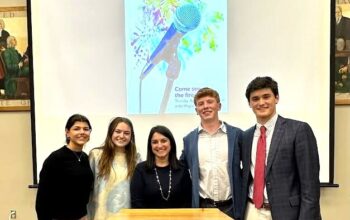Eva Pace, Arts & Tech Editor
@espcourant
Let’s be honest, how many NCHS students turn to the library databases first-thing once they’re assigned a research project? The answer is very few. In reality, some students have barely even scrolled through the library website. This isn’t because the resources are inadequate, it is simply because platforms like Destiny Quest and the databases with their endless passcodes can be difficult to navigate. With this problem in mind, our school librarians and media specialists went to work and made some notable changes to the library website and databases to help NCHS students make the most out of their research.

Technology and media specialist Michelle Luhtala knew something had to be done to change the database process. “The number one most often texted question to the library was ‘What’s the username and password to the database page?’” she said. “So, we’ve been striving to find technologies that would eliminate as many barriers as possible to access those resources so that students could focus on the learning and not the how-to part.”
Among the alterations is the addition of a database search widget right on the front page of the library’s website. Junior TechXpert Spencer Reeves thinks that this seemingly small change is incredibly helpful. “This frees up lots of time, because instead of clicking through many pages, it is right at the top,” he said. “It is like going to Amazon to buy multiple products, rather than going to their specific stores. It is much more efficient.”
According to Ms. Luhtala, accessibility to these resources is incredibly important, particularly during different parts of the research process. “When students are starting out and just trying to grasp big ideas, they can rely on fairly superficial resources,” she said. “Once they get to synthesis and really crack down on their thesis statement, they start to realize where the gaps are in their research and that’s when database access is helpful.”
A lesser-known fact about the benefits of taking advantage of the NCHS databases is that understanding how to navigate these resources is necessary in college. “It’s an expectation when students get to college that they will be able to use databases, and their college library websites will not be as user-friendly as the one they have access to now,” Ms. Luhtala said. “In college, the students will be able to see familiar research tools and move straight to the learning process.”

The process of updating the website was nothing short of challenging for the library media specialists, and it required a lot of innovation. “The ability to sign into databases with your Google sign-in is something that has not been done in any high school so far,” Ms. Luhtala said. “There’s a lot of pieces we’re trying to fit together that were not necessarily intended to fit together, so it has been a fairly complicated process.”
Ms. Luhtala emphasized how crucial it is for students to get involved and make these new updates run as smoothly as possible. “If students are running into dead ends, we need to know the name and title of the article they’re looking at,” she said. “They can text the library or come see us, anything that will help us get those results to the database company so they can fix the issue.”
Students can expect even more intricate updates to the website to fine-tune the database process in the future. All in all, the media specialists are trying to make student resources the best they can be, and they’re going to the next level to do so. “We’re pushing the envelope; these are big companies we’re talking to,” Ms. Luhtala said. “We pay close attention to where students struggle the most and try to find solutions to those problems. That’s our challenge but it’s a great feeling when we succeed.”




